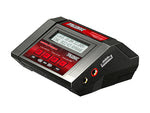Navigating High Voltage Battery Chargers: Understanding the Power
In the realm of electronics and energy management, the evolution of battery technology has been nothing short of remarkable. Batterycharger high voltage stands as a testament to this progress, offering efficient and rapid charging solutions for a wide array of devices, from smartphones to electric vehicles. However, delving into the intricacies of high-voltage battery chargers requires a comprehensive understanding of their function, benefits, and potential considerations.
Unpacking High Voltage Battery Chargers:
Battery chargers’ high voltage are devices designed to recharge batteries at voltages higher than conventional chargers. These chargers are particularly prevalent in industries where fast charging and high energy density are paramount, such as electric vehicles (EVs), renewable energy storage systems, and industrial equipment.
The Benefits of High Voltage Charging:
●
Faster
Charging Times: High voltage chargers can deliver more power to batteries,
resulting in shorter charging cycles. This is especially advantageous in
applications where downtime is a concern, such as electric vehicles and
portable electronics.
●
Improved
Energy Efficiency: By utilizing higher voltages, high voltage chargers can
achieve greater energy efficiency, reducing energy losses during the charging
process. This not only conserves energy but also helps lower operational costs
over time.
●
Enhanced
Power Density: High voltage chargers enable the charging of batteries with
higher energy densities, allowing for the storage of more energy in a smaller
footprint. This is critical for applications where space constraints are a
consideration, such as wearable devices and drones.
Considerations and Challenges:
While high-voltage
battery chargers offer compelling advantages, they also present certain
considerations and challenges that must be addressed:
●
Safety
Concerns: Operating at higher voltages requires robust safety measures to
prevent electrical hazards, such as short circuits, overheating, and
overcharging. Proper insulation, thermal management, and voltage regulation are
essential to ensure the safe operation of high-voltage chargers.
●
Battery
Compatibility: Not all batteries are suitable for high-voltage charging. It's
crucial to verify compatibility and adhere to manufacturer specifications to
prevent damage to the battery and ensure optimal performance.
●
Heat
Dissipation: High voltage charging can generate more heat than conventional
charging methods, necessitating effective heat dissipation mechanisms to
maintain optimal operating temperatures and prevent thermal runaway.
Applications of High Voltage Battery Chargers:
●
Battery chargers’
high voltage find applications across a diverse range of industries and
technologies, including:
●
Electric
Vehicles: High voltage chargers play a crucial role in powering the
electric drivetrains of vehicles, enabling rapid charging and extended driving
ranges.
●
Renewable
Energy Storage: Battery systems used to store energy from renewable sources,
such as solar and wind, rely on high-voltage chargers to maximize efficiency
and reliability.
●
Portable
Electronics: High-voltage chargers deliver fast and efficient charging
solutions for smartphones, laptops, and other portable devices, making them
convenient for on-the-go use.
● Industrial
Equipment: High-voltage battery chargers are integral to powering
heavy-duty industrial machinery and equipment, where reliability and
performance are paramount.
Briefly Put!
Battery chargers with high voltage represent a
significant advancement in battery charging technology, offering faster
charging times, improved energy efficiency, and enhanced power density. While
they present certain considerations and challenges, their widespread adoption
across various industries underscores their importance in driving innovation
and sustainability.


Comments
Post a Comment